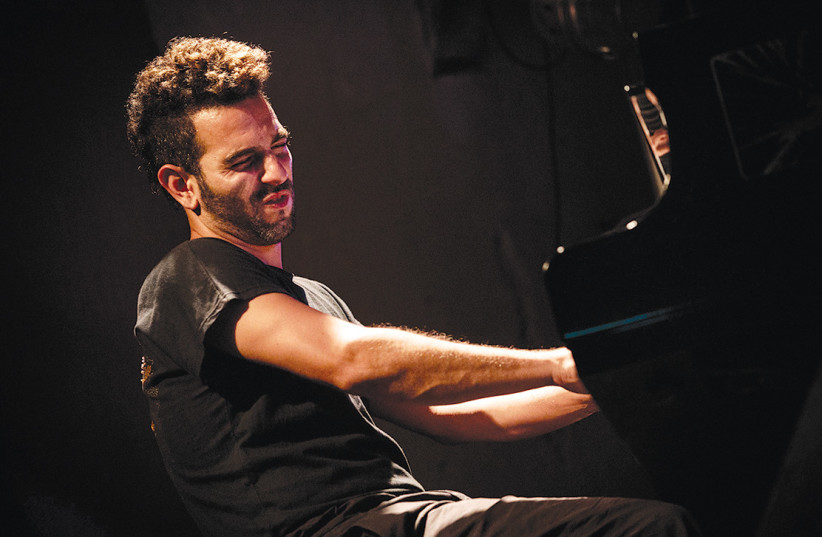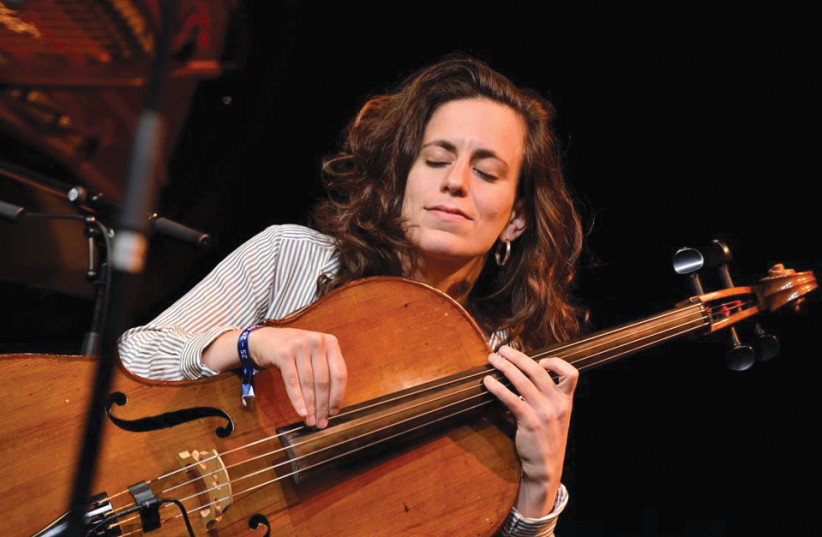We have plenty to crow about over here. Michael Wolpe should know. For the past 10 years the acclaimed pianist, composer and educator has made concerted efforts to promulgate that message, inter alia, as artistic director of the annual Piano Festival.
The first decade-closing edition will take place at its regular berth of the Jerusalem Theatre November 23-26.
This year’s four-dayer will focus primarily on works from the late Romantic period, taking in charts from the likes of Tchaikovsky, Rachmaninoff, Dvorak and Grieg. But anyone who has ever attended a festival or concert devised by Wolpe will know that he tends to flex the demarcation lines of genre and stylistic fields. That is clearly the case with the forthcoming presentation in Jerusalem, too.
Cherry-picking from the vast domain of the late Romantic period may not sound too much like going out on an artistic directorial limb, but Wolpe has also gone for the odd obscure work, as well as doing his best to run the local flag up the mast. That comes with the personal philosophy territory, but it probably also helps that, by now, the Piano Festival is well and truly established on our cultural map.
Wolpe has the collateral for stepping into uncharted waters.

“Last year we went for all the Mozart concerti. I think that was quite a risk. I really didn’t know if it would succeed,” he recalls.
This time round the risk factor stems from the contemporary fare he has slotted betwixt the tried-and-tested items. “This year I have inserted an Israeli work between the well-known concerti from the late Romantic period. There are a lot of Israeli pieces in the festival this year, which I would say is my guiding line.”
Spreading the cultural net
WOLPE HAS a habit of spreading his cultural net into far-flung corners and not snubbing his well-educated and richly experienced nose at more popular, more commercially oriented material. His annual Desert Sounds Festival, for example, which takes place at his home base of Kibbutz Sde Boker down in the Negev, will typically feature a Mozart string quartet, electronic music, liturgical songs and Israeli pop numbers. As far as Wolpe is concerned, there is no class structure when it comes to creative output.
He is also keen to introduce his audiences to artistic endeavor that may have a celebrated composer’s name attached to it but, for some reason, hardly gets an airing in the world’s leading venues.
“I have also placed lesser-known Romantic works in between the very popular ones,” Wolpe notes.
“There is a concerto by Dvorak which has not been performed in Israel since the 1960s.”
Michael Wolfe

The said neglected work is the late 19th-early 20th century Czech composer’s Concerto for Piano and Orchestra in G minor, Op. 33, due to be aired on November 24 (8 p.m.) by The Israel Sinfonietta Beersheba, conducted by Noam Aviel, with Dani Dvorkin taking the soloist limelight. Earlier this year Dvorkin won the prestigious Tel Hai International Piano Master Classes competition. That will be followed, in an all-female soloist presentation, by Grieg’s Concerto for Piano and Orchestra in A minor, Op. 16, with Shir Semel at the piano, while Dorel Golan plays Rachmaninoff’s ever-popular Concerto for Piano and Orchestra No. 2 in C minor, Op. 18.
THEREIN LIES another corrective Wolpe programming focus – helping to give female composers and artists, contemporary and yesteryear alike, long overdue credit for their work in a male-dominated world. This year’s lineup includes a large number of concerts featuring female artists and compositions by women. There will also be some silver screen entertainment and enlightenment on the topic.
“We will show a new movie – this will be its [Israeli] premiere – called Women Composers,” says Wolpe. “It is a German movie which came out a few months ago about female composers from the 19th century. Of course, everyone knows about Fanny Mendelssohn, but the film relates the story of many female composers who were active in the 19th century. There are some amazing musical excerpts that are performed by superb German orchestras – symphonies and concerti.”
Fanny Mendelssohn, the older sister of famous German early Romantic composer Felix Mendelssohn, wrote hundreds of works for piano and voice, as well as trios and quartets, but rarely performed outside her close family circle. Due to social mores of the time, several of her compositions were credited to Felix, and it took quite a while for the inaccuracy to be addressed. Her Easter Sonata for piano, for example, was lost for a century and a half, and, when discovered, it was thought to be the work of Felix. It took until 2010 for that to be put right.
Fanny is front and center in Women Composers, as are French late Romantic composer Mel Bonis and compatriot early-20th-century composer Lili Boulanger, the first female winner of the prestigious Prix de Rome.
While Wolpe supports the idea of giving talent its due, regardless of gender – there will be ample evidence of that on show at the Jerusalem Theater next week – Wolpe warns against promoting scores written by women just to offset ongoing male-oriented prejudice.
“You have to be wary of the pendulum effect,” he says, referencing the theory that trends in culture, politics and other areas have a tendency to swing back and forth across extremes. He cites his own recent experience of overcompensating for injustices committed against women in cultural climes. “You always have to choose good works. There are, for example, wonderful trios such as the work by Aviya Kopelman [in the current festival program]. A short while ago I went to a festival in England of music written by women. It was terrible, boring,” he exclaims. “We have to be careful of involving politics in music. A woman, anyone, should compose or play music because they have the talent and ability to do that, and for no other reason.”
Kopelman is an established member of the upper echelons of the Israeli classical music community. She is one of the youngest-ever winners of the Prime Minister’s Prize for Composition and has served as composer-in-residence of the Jerusalem Symphony Orchestra since 2013.
What makes Kopelman tick?
FESTIVALGOERS WILL gain some insight into what makes Kopelman tick, in one of several topical tête-à-têtes when she sits down to chat with Wolpe about female composers who had the gumption to make their creative voice heard, against all odds, in the last 200 years. That is set for 5 p.m. on Thursday, after which festivalgoers can proceed to the 6:30 p.m. Spaces concert, which opens with Kopelman’s Piano Trio, followed by Tchaikovsky’s Piano Trio in A minor, Op. 50.
Other talks have the artistic director sitting down with pianist, composer and conductor Gil Shohat, who also has a work in the festival itinerary, and with pianist Amit Dolberg in a look at contemporary music. Internationally acclaimed pianist Guy Mintus also gets in on the act, joining mentor Asaf Zohar in improvising and talking about Tchaikovsky’s The Seasons.
Mintus turns up again at the Friday morning (10 a.m.) session when Wolpe hosts him along with fellow instrumentalists Nizar Elkhater and Anat Fort.
Anyone who goes along to that will have a better idea of what to expect from the works featured in the subsequent slot, at 12 noon, when all four pianists – Wolpe included – play their own new works together with the Jerusalem Orchestra East and West, conducted by Tom Cohen. Each of the compositions was inspired by the oeuvre of a late Romantic composer. Fort – better known as a mover and shaker on the global jazz scene – will present her Grieg’s “Fantasy”; Elkhater and Mintus draw on music by Brahms and Tchaikovsky, respectively; while Wolpe mined Dvorak’s rich seams for his muse.
The only offshore piano talent on the festival bill is Davide Cabassi, who hosts fellow ivory tickler Yaron Rosenthal in one of the Piano Bar slots. The award-winning Italian will play a broad range of Romantic works, including by Schumann and a number of his compatriots.
Jazzing up the festival
TRUE TO his egalitarian cultural ethos, Wolpe is more than happy to jazz things up at the festival. Fort is, naturally, on the Piano Bar jazz roster, fronting a high-class threesome with David Michaeli on double bass and Shahar Haziza powering matters from behind his drum set on November 24 (5:30 p.m.). Later that evening Uriel Hermann will push the energy level up a notch or two when he joins forces with bassist Avri Borochov and drummer Haim Peskoff in the Rock and More set. Together they will explore improvisational approaches to popular numbers by rock giants such as David Bowie, Nirvana and Radiohead.
Ever eager to open a door or two for emerging talents, Wolpe also has young pianist Aviv Lidani doing a turn at the Piano Bar, while Lior Soltz will take his audience along a merry meandering path along many a stylistic byway.
Back to the distaff side of the program, over the years Orit Wolf has gained a reputation for her concert programs that come with illuminating talks about the composer or style in question. Friday morning’s Rachmaninoff: A Chamber Marathon sees the pianist team up with fellow instrumentalist Inbar Rothschild, soprano vocalist Shiri Magar and American-born cellist Kristina Reiko Cooper. Together they will unfurl some of the Russian composer’s less frequently performed pieces, such as the Suite for Two Pianos, Op. 5, Cello and Piano Sonata and his haunting 1915 “Vocalise” song.
There is more Israeli fare on offer at the Wednesday evening (6:30 p.m.) Abstract World concert with the Amber Trio. Pianist Lior Kretzer, violinist Uri Dror and cellist Ira Givol start out with Paul Ben-Haim’s stirring Variations on a Hebrew Melody for Piano Trio, written in 1939. Thereafter, the threesome will be joined by Italian-born violist Cesare Zanfini, returning to the festival’s thematic style with Brahms’s Piano Quartet in G minor, Op. 25.
The closing evening of the festival sees our grand dame of popular Israeli songwriting, Nurit Hirsh, get a well-deserved tribute from a cappella Quinta and a Half Vocal Ensemble. The sextet will perform a wide spread of Israeli songs from the 1970s and 1980s, as well as contemporary Israeli folk, with new arrangements of some of evergreen Hirsh’s vast oeuvre.
Stick around until the end
ANYONE HANGING around to the end of the festival can catch an alluring spot at the Piano Bar when pianist Nadav Vikinski and vocalist Noa Kashpizki ply their way through a potpourri of songs from Hebrew theater soundtracks. Wolpe is more than happy to have the duo in the lineup.
“Nadav is an exceptional theater composer,” he notes. “He wrote a mosaic of theater numbers. I see him as the Israeli Kurt Weil.” Higher praise is hard to come by.
If that isn’t quite enough to whet the appetite, one can also note the November 26 (7 p.m.) date with the Jerusalem Symphony Orchestra conducted by Shanghai-born Tel Aviv Prof. Yi-An Xu. The Symphonic Variations concert opens with Concerto for Piano and Orchestra by 68-year-old Israeli composer Ari Ben-Shabetai, with Dolberg in the solo spot, followed by works by Franck and Brahms, with Tomer Lev and Malachi Rosenbaum doing the pianistic honors, respectively.
Throw in the Farewell to Chopin documentary based on Arthur Rubinstein’s last performance of Chopin’s Second Piano Concerto, and another contribution from the Hermann Trio, this time adding a twist or two to material by iconic Israeli songwriters Mordechai Zeira and Avihu Medina, with cellist-vocalist Maya Belsitzman adding her considerable melodic firepower to the proceedings. There are plenty of reasons to be cheerful at the Jerusalem Theatre later next week. ❖
For tickets and more information: www.jerusalem-theatre.co.il
